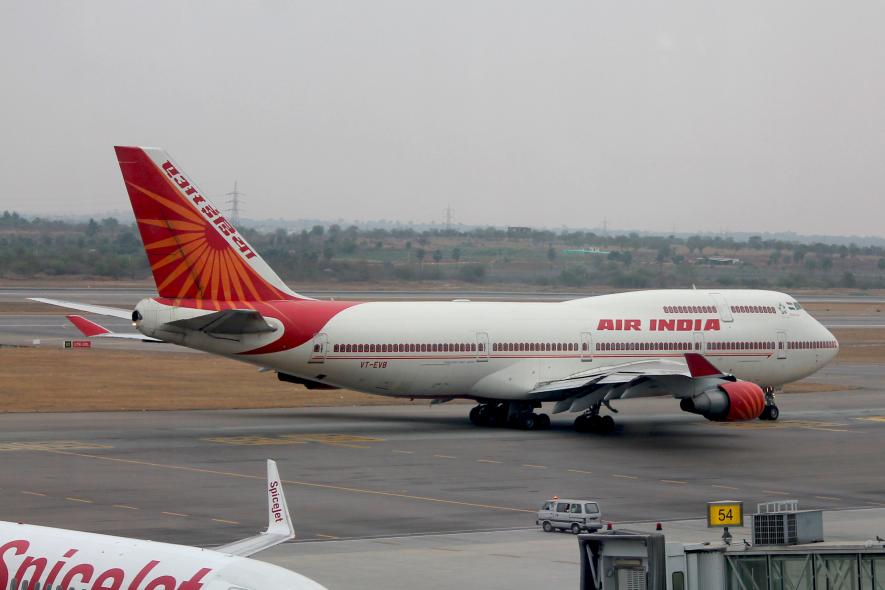‘Air India Sale to Create Oligopoly’: Central Trade Unions Tell PM to Roll Back Privatisation Policy

The Central Trade Unions on Tuesday sent a letter to Prime Minister Narendra Modi demanding the rollback of the policy to sell national assets, including Air India.
On October 8, 2021, the Centre disinvested 100% of its stake in Air India and 100% in the low-cost airline Air India Express Ltd, ending the privatisation process that began in 2001 during the Atal Bihari Vajpayee-led government. The Tata Sons subsidiary, Talace Pvt. Ltd., has won the bid for the national carrier.
The Central Trade Unions have accused the government of denigrating PSUs as “loss-making” and using that as a pretext to sell them off.
“While the Corporate chieftains and the media have gleefully welcomed the sale of Air India, we must admit, we, the people of India, including the Air India Employees, are most unhappy,” the Central Trade Unions’ letter said, citing several reasons behind their position.
The letter said that in 2019-20, Air India made an operating profit of Rs. 1,787 crore, but its overall balance sheet reflected a loss of Rs. 7,427 crore because of the heavy burden of interest payments (Rs. 4,419 crore) and deprecation (Rs. 4,795.30 crore). They argued that the reason for Air India’s massive debt burden is four specific sets of government policies.
Elucidating on the four sets of policies, the letter said the first among them was the decision taken in 2005-2006 to place an enormous order to purchase 111 aircraft at one go by Air India and Indian Airlines. In the second decision, the government “forced” Air India and Indian Airlines to merge into Air India Limited a year later. The third, according to the trade unions, is the aggressive pursuit of an “Open Skies” policy in India by successive governments even though other countries did not follow this line. “The fourth dimension of the longstanding and systematic neglect of Indian public sector airline companies has been the manner in which the interests of the two companies were blatantly surrendered to please private players,” the letter said.
The Central Trade Unions also claimed that Air India has been “sold for a song” at Rs 18,000 crore, whereas the minimum price set by the government was Rs 12,906 crore. There were only seven bid responses, of which five were disqualified. Calling it a “sweetheart deal” for India’s oldest conglomerate, the letter pointed out the massive assets of Air India that Tata Group is getting: 141 aircraft, of which 118 are in airworthy condition, its airbuses, and rest of the fleet, Air India’s well-trained workforce as well as 4,400 domestic and 1,800 international slots at Indian airports and 900 overseas.
The letter argued that the sale of Air India to Tatas amounted to the making of an Oligopoly, where a small number of suppliers dominates a market. It said that the combined revenues of Air India, Vistara and Air Asia amounted to Rs 40,500 crore in 2020, constituting around 42% of the total industry revenue of Rs 95,700 crore. Since the Tatas also own Vistara and Air Asia, the privatisation of Air India has resulted in one of the most concentrated markets in India, the letter said.
In their letter to the PM, the Central Trade Unions also underlined the uncertainty hanging over the 14,000 strong workforces as the government’s announcement that the interests of employees would “be taken care of” lacked clarity. The letter noted that the Air India employees have been pushed to serve a notice of strike due to a directive issued in September by the Ministry of Civil Aviation for evicting them from their quarters within six months. “The very same employees had been praised when they selflessly flew Air India flights to evacuate Indians trapped in dangerous situations,” the letter said.
Besides withdrawal of the eviction directive, the unions demanded a rollback of the government’s privatisation policy for national assets and the sale of Air India.
Get the latest reports & analysis with people's perspective on Protests, movements & deep analytical videos, discussions of the current affairs in your Telegram app. Subscribe to NewsClick's Telegram channel & get Real-Time updates on stories, as they get published on our website.






















